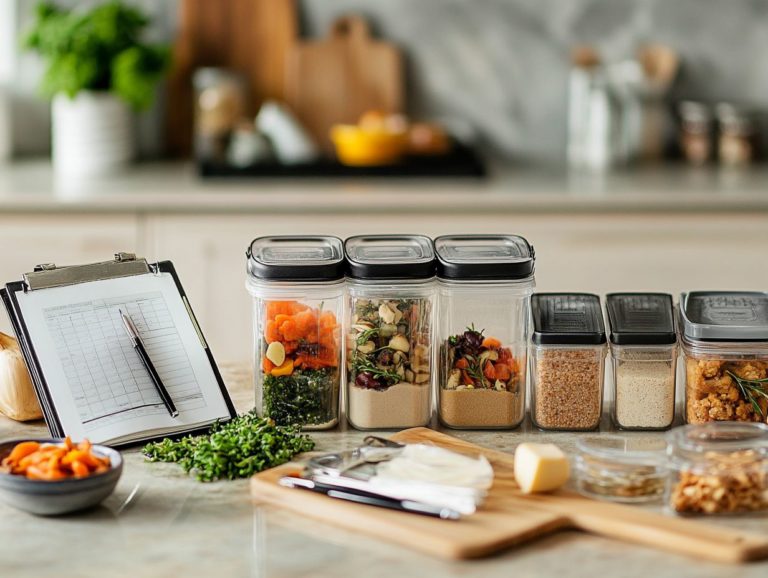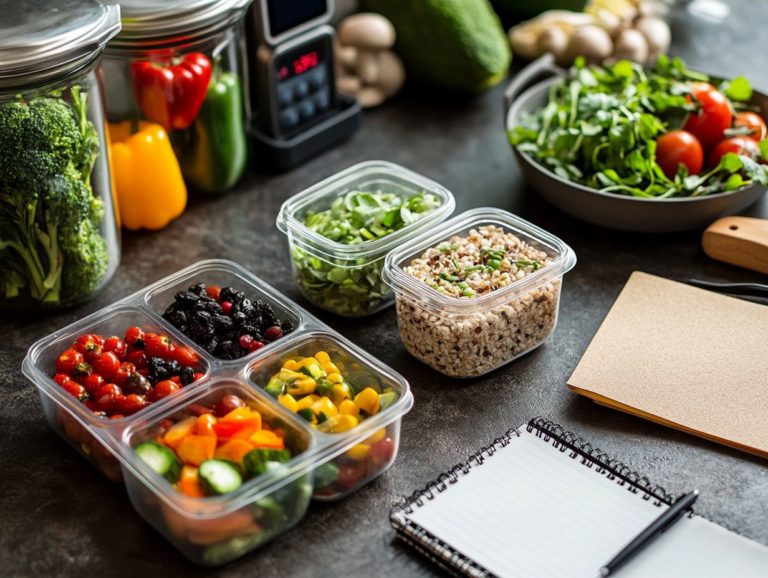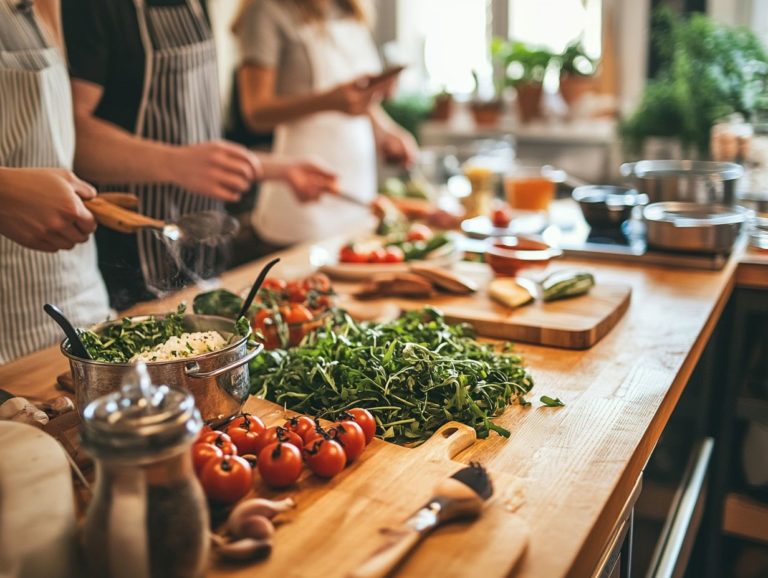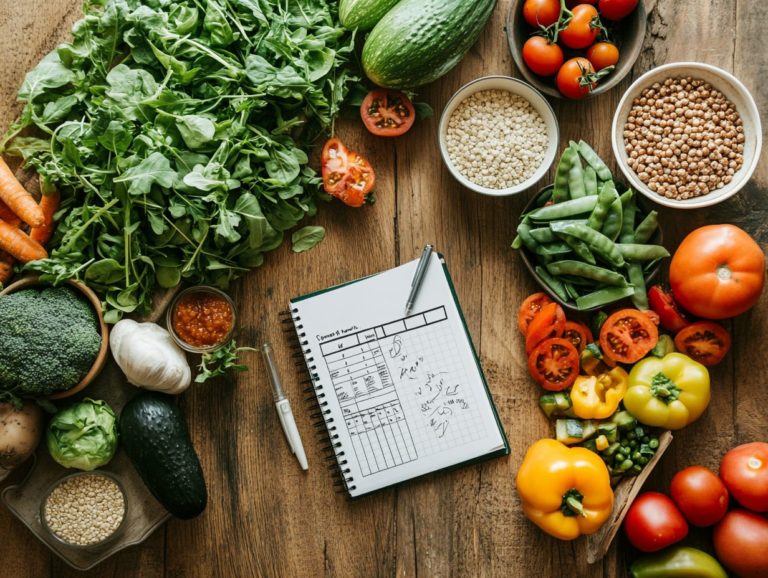Meal Planning for Seniors: What to Know
Meal planning is an essential element in maintaining health and well-being as you age. For seniors, it transcends mere convenience; it s about ensuring that your nutrition aligns with your unique dietary needs and preferences.
This discussion delves into the myriad benefits of meal planning, including enhanced dietary compliance and improved overall wellness. You ll explore crucial factors to consider, practical tips for crafting balanced meal plans, and valuable resources to simplify your meal prep.
Embark on this journey as you discover key elements that make meal planning for seniors not just effective, but truly rewarding.
Contents
- Key Takeaways:
- Understanding the Importance of Meal Planning for Seniors
- Factors to Consider when Meal Planning for Seniors
- Tips for Creating a Meal Plan for Seniors
- Resources for Meal Planning for Seniors
- Frequently Asked Questions
- What is meal planning for seniors?
- Why is meal planning important for seniors?
- What are some tips for meal planning for seniors?
- What type of foods should be included in a meal plan for seniors?
- Are there any resources available for meal planning for seniors?
- What are the potential benefits of meal planning for seniors?
Key Takeaways:
- Meal planning boosts overall health for seniors.
- Consider dietary restrictions to ensure balanced nutrition.
- Nutrient-rich foods and portion control are essential.
- Utilize resources like cookbooks and meal delivery for ease.
Understanding the Importance of Meal Planning for Seniors
Meal planning is essential for your health and well-being as a senior. It ensures that your dietary needs are met with a balanced diet full of essential nutrients, especially when considering meal planning for special dietary needs.
As you age, your body experiences various changes. It’s crucial to focus on nutritious meal options tailored to your specific health conditions or restrictions. Meal planning simplifies grocery shopping and fosters healthy eating habits by encouraging the use of fresh ingredients and well-balanced meals.
By mastering meal planning, you can transform your quality of life, maintain your independence, and enjoy a delightful variety of savory dishes.
Benefits of Meal Planning for Seniors
Meal planning offers a wealth of benefits for seniors, including better nutrition, improved portion control, and reduced stress when grocery shopping.
By organizing meals ahead of time, you can cultivate healthier eating habits, ensuring that your diet is balanced and rich in vitamins and minerals. This approach reduces your reliance on unhealthy convenience foods while cutting down on food waste. With a well-crafted shopping list tailored to specific recipes, you can shop with precision and purpose.
Meal planning also supports dietary restrictions or preferences. Whether you need to focus on low-sodium or diabetic-friendly options, it significantly contributes to your overall well-being.
As a result, you can savor the dual benefits of optimized health outcomes and enhanced culinary satisfaction.
Factors to Consider when Meal Planning for Seniors
When crafting a meal plan for seniors, consider several factors that influence nutritional needs, including dietary restrictions, medical conditions, and personal preferences. Understanding these elements is key to ensuring meals are both nutritious and delightful.
Seniors often face unique health challenges, such as diabetes, heart disease, or osteoporosis. These conditions can significantly impact dietary requirements. Changes in appetite and preferred cooking methods can also shape meal planning, making it essential to customize plans accordingly.
By considering these factors, caregivers and seniors can create meal strategies that promote overall health and well-being.
Dietary Restrictions and Preferences
Dietary restrictions and preferences play a crucial role in meal planning for seniors, as they greatly shape food choices and meal preparation.
For those with conditions like diabetes or heart disease, a meticulous approach to nutrition is essential. Meals must be thoughtfully tailored to support health while adhering to specific dietary guidelines.
Individuals managing diabetes often pay close attention to carbohydrate and sugar levels, favoring complex carbs and fiber-rich foods. Seniors with heart concerns may need to monitor sodium and unhealthy fat intake.
It s important to find a balance between dietary requirements and personal tastes to create meals that are both enjoyable and nutritious. By incorporating favorite flavors and textures, caregivers can design meal plans that meet dietary needs while also providing satisfaction and promoting overall well-being.
Start your meal planning today to enhance health and enjoy delicious meals!
Medical Conditions and Nutritional Needs
Understanding medical conditions and their nutritional requirements is essential for effective meal planning tailored to the elderly population. As you age, you may encounter various health issues like diabetes and heart disease. These conditions call for customized eating plans to support your overall well-being.
For those managing diabetes, it is critical to monitor carbohydrate intake and choose low glycemic index foods. If heart disease is a concern, focusing on heart-healthy fats and increasing fiber intake can make a significant difference.
Don’t overlook the importance of essential nutrients, such as vitamin B12, which is vital for maintaining nerve health and cognitive function. By ensuring a balanced intake of these nutrients, you can greatly enhance the quality of life for seniors facing these medical challenges.
Tips for Creating a Meal Plan for Seniors
Crafting a successful meal plan for seniors requires a thoughtful approach centered on nutrient-dense foods while considering meal planning tips for busy families to prioritize ease and convenience in meal preparation.
Consider incorporating these essential tips to enhance the dining experience and nutritional value.
Incorporating Nutrient-Dense Foods
Nutrient-dense foods are essential for meeting dietary needs as you age. They provide vital vitamins and minerals while also supporting cognitive function and boosting your immune system.
Leafy greens like spinach and kale are packed with antioxidants. Whole grains such as quinoa and brown rice offer sustained energy and fiber, aiding in digestion.
Colorful fruits like berries and oranges not only brighten your plate but also enhance vitamin intake. They help protect against chronic diseases. Don t overlook protein sources either; lean chicken and fatty fish like salmon are crucial for maintaining muscle mass and delivering heart-healthy omega-3 fatty acids.
A well-rounded diet that includes these options can significantly enhance your vitality and quality of life as you embrace your golden years.
Meal Prep and Portion Control
Meal prep and portion control are essential for ensuring that seniors enjoy nutritious meals while effectively managing their dietary intake.
By organizing ingredients in advance and preparing meals for the week ahead, you can significantly simplify the cooking process. This reduces stress and minimizes time spent in the kitchen.
This strategy gives you the power to focus on wholesome options that align with your dietary needs, steering clear of unhealthy, last-minute choices.
Controlling portion sizes is crucial. It helps prevent overeating and enables better management of health conditions like diabetes or heart disease.
Ultimately, by integrating these practices, you not only enhance your nutrition but also elevate your overall quality of life.
Resources for Meal Planning for Seniors
You have amazing resources available to help you with effective meal planning.
From specialized cookbooks to a myriad of online recipes and meal delivery services, you have options that cater to both your preferences and dietary requirements.
Cookbooks and Online Recipes
Cookbooks and online recipes serve as invaluable resources as you seek to elevate your meal planning and embrace healthier eating habits.
These resources are brimming with simple, nutritious recipes that cater to a variety of dietary needs. They allow you to whip up meals without the anxiety of navigating complex cooking techniques.
Many cookbooks specifically tailored for older adults emphasize quick preparation and minimal ingredients, simplifying the journey toward maintaining a balanced diet.
Online platforms enhance this experience with interactive features, like engaging videos and community discussions, which can deepen your understanding of various cooking methods.
By utilizing these tools, you ll save valuable time in the kitchen, giving you more moments to enjoy life while discovering new favorite dishes that foster both well-being and enjoyment.
Embrace these strategies and enjoy every delicious bite!
Meal Delivery Services
Meal delivery services are becoming popular among seniors. They provide a convenient way to access nutritious meals tailored to dietary needs.
Imagine daily deliveries that save seniors from grocery shopping and meal prep. This allows older adults to enjoy freshly prepared dishes without the stress.
Many providers offer nutrition consulting to create healthy meal plans that fit individual health requirements.
This approach encourages better eating habits and enhances overall well-being, giving seniors the power to lead more independent lives.
By focusing on convenience and nutrition, meal delivery services are crucial resources for many aging individuals.
Frequently Asked Questions
What is meal planning for seniors?
Meal planning for seniors means selecting and preparing meals in advance. This process meets the specific nutritional needs of older adults, considering dietary restrictions and food preferences, and can benefit from meal planning tips for working professionals.
Why is meal planning important for seniors?
Meal planning helps seniors get the nutrition they need to stay healthy. As we age, our nutritional needs change, and planning meals can prevent malnutrition.
What are some tips for meal planning for seniors?
Involve seniors in the planning process to consider their preferences. Focus on nutritious foods, variety, and easy meals. A well-stocked pantry also simplifies planning.
What type of foods should be included in a meal plan for seniors?
A meal plan should include nutritious foods like lean proteins, fruits, vegetables, whole grains, and healthy fats. Also, include calcium and vitamin D for bone health while limiting processed foods.
Are there any resources available for meal planning for seniors?
Yes, many resources exist. Local community centers often provide cooking classes or workshops. There are also online resources and meal delivery services tailored for seniors.
What are the potential benefits of meal planning for seniors?
Meal planning can improve nutrition, help manage chronic conditions, boost energy, and save money. It also offers a chance for socializing and enjoying meals with loved ones.





